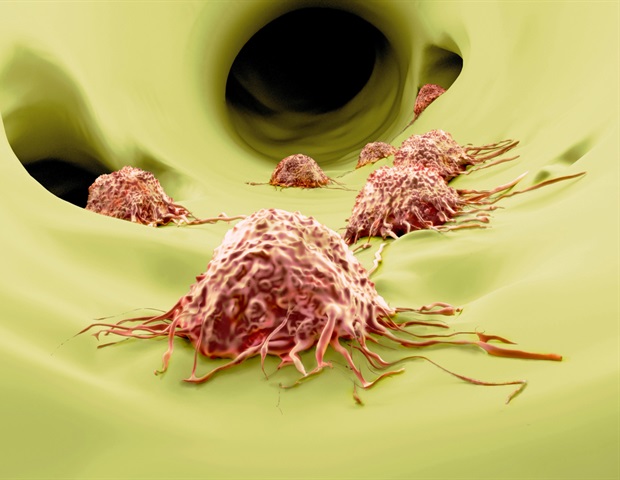
Researchers from the lab of Prof. Sarah-Maria Fendt (VIB-KU Leuven) and colleagues have uncovered that the supply of the amino acid aspartate is one purpose why the lung is a frequent organ of metastasis. Their work seems in Nature and improves our understanding of most cancers biology whereas offering the muse for brand spanking new therapeutic interventions in metastatic illnesses.
A job for aspartate
Greater than half of most cancers sufferers in whom the most cancers spreads past the first website have lung metastases. What makes the lungs such a tempting place for most cancers cells?
To search out out, the staff of Prof. Sarah-Maria Fendt (VIB-KU Leuven Heart for Most cancers Biology) and colleagues investigated the gene expression in cells from aggressive lung metastases. They discovered proof for another ‘translation program.’ What does this imply? Translation is the method that makes use of our genetic code as a blueprint to make proteins in cells. A change within the translational program ends in a set of various proteins that enable most cancers cells to develop simpler within the lung setting.
However what begins this different translational program in aggressive metastases?
Ginevra Doglioni, PhD pupil on the Fendt lab and first creator of the examine says “We discovered excessive ranges of aspartate within the lungs of mice and sufferers with breast most cancers in comparison with mice and sufferers with out most cancers, which means that aspartate could also be necessary for lung metastasis”
Aspartate is an amino acid (a protein constructing block) that has very low concentrations in blood plasma however, surprisingly, very excessive concentrations within the lungs of mice with metastatic breast most cancers.
Beginning the translational program
Many proteins in our our bodies can have an effect on the interpretation course of, amongst them the so-called initiation components. One such initiation issue is eIF5A, which kickstarts translation. Within the cells of most cancers cells inside lung metastases, the researchers discovered an activating modification to eIF5A referred to as ‘hypusination’, which was related to larger most cancers aggressiveness of lung metastases.
Does aspartate have one thing to do with this?
Sure, it does! The researchers found that aspartate triggered this modification on eIF5A by an surprising mechanism. Surprisingly, aspartate was not taken up by the most cancers cells. As a substitute, it activated a cell floor protein referred to as an NMDA receptor in most cancers cells, resulting in a signaling cascade that, ultimately, triggered eIF5A hypusination. This subsequently drives a translational program that enhances the power of most cancers cells to vary their setting and make it extra appropriate for aggressive progress.
human lung tumor samples from sufferers with metastatic breast most cancers, the scientists famous an identical translational program as in mice and an elevated expression of the NMDA receptor subunit that binds aspartate in comparison with metastases from different organs.
This correlation emphasizes the relevance of the findings in a medical context and means that aspartate signaling could also be a standard function of most cancers cells rising within the lung. Furthermore, there are medicine obtainable to focus on the mechanism we recognized and thus with additional analysis a translation towards a medical setting is perhaps doable.”
Prof. Sarah-Maria Fendt, VIB-KU Leuven Heart for Most cancers Biology
Funding
This analysis was supported by FWO, Kom Op Tegen Kanker, Stichting tegen Kanker, Beug Basis, King Baudouin Basis, Fonds Baillet Latour, Francqui Stichting, Basis ARC, and KU Leuven.
Supply:
Journal reference:
Doglioni, G., et al. (2025). Aspartate signalling drives lung metastasis by way of different translation. Nature. doi.org/10.1038/s41586-024-08335-7.
